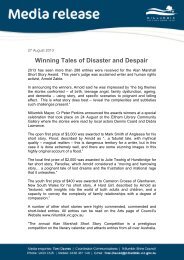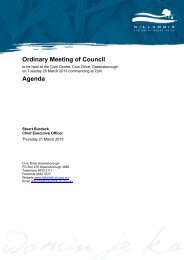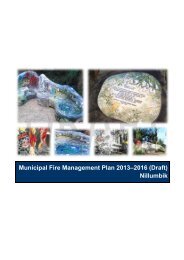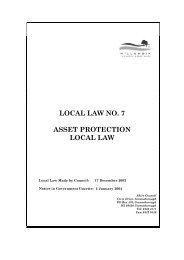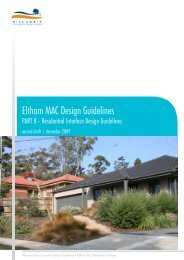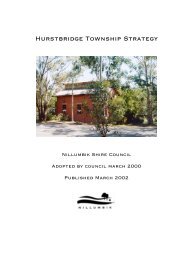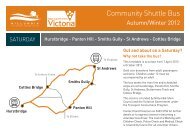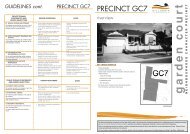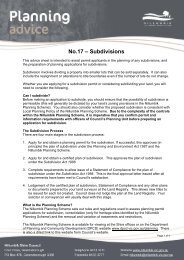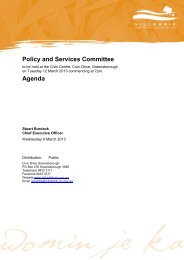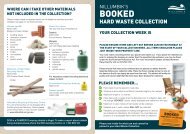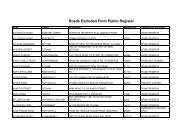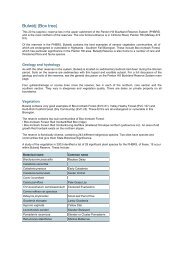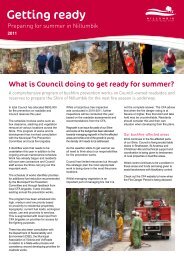Sustainable Water Management Plan - Nillumbik Shire Council
Sustainable Water Management Plan - Nillumbik Shire Council
Sustainable Water Management Plan - Nillumbik Shire Council
Create successful ePaper yourself
Turn your PDF publications into a flip-book with our unique Google optimized e-Paper software.
Sediment and erosion control<br />
Construction site management<br />
To reduce contaminants entering stormwater from<br />
construction sites, <strong>Council</strong> incorporated a clause<br />
in Local Law Number 7 Asset Protection Law,<br />
Part 6 Stormwater Protection. It states that ‘where<br />
any building or other work is being carried out on<br />
any land, the owner must ensure that the site is<br />
developed and managed to minimise the risk of<br />
stormwater pollution, through the contamination of<br />
run-off by chemical, fill, sediments, animal wastes,<br />
gross pollutants or any other material or substance<br />
in accordance with currently accepted best practice.’<br />
Information detailing builders/developers<br />
responsibilities in regard to this Local Law<br />
is provided with relevant building permits. In<br />
environmentally significant areas covered by an<br />
Environmental Significance Overlay, applicants are<br />
required to submit a Land <strong>Management</strong> <strong>Plan</strong> with<br />
planning permit applications which require standard<br />
sediment control procedures to be addressed.<br />
<strong>Council</strong> employs a Works Development Officer<br />
and <strong>Plan</strong>ning Investigations Officers to monitor<br />
compliance with Local Law and planning permit<br />
conditions.<br />
<strong>Council</strong> also requires that all tenders for construction<br />
works on <strong>Council</strong> land must submit a site<br />
management plan and risk assessment which details<br />
any erosion and sediment control procedures to be<br />
implemented.<br />
Revegetation and regeneration<br />
programs<br />
<strong>Council</strong>’s Environmental Works Unit and Parks and<br />
Reserve Maintenance Unit undertake a number of<br />
revegetation and regeneration projects annually<br />
in degraded riparian environments to improve<br />
water quality and habitat values in and around<br />
local waterways. Priority areas are identified and<br />
assessed, and in some instances management<br />
plans are developed, for <strong>Council</strong> parks and reserves.<br />
Projects include fencing, rabbit control, weed<br />
control, revegetation, bank stabilisation and wetland<br />
management. <strong>Council</strong> also supports approximately<br />
30 Friends and Landcare groups undertaking<br />
environmental projects on <strong>Council</strong> land.<br />
Landcare support and grants programs<br />
There are a number of Landcare Groups in the <strong>Shire</strong><br />
which work together on private property to undertake<br />
environmental improvement activities, particularly<br />
along waterways and habitat corridors. Activities<br />
include fencing, bank stabilisation, revegetation,<br />
seed collection, plant production and weed and<br />
rabbit control. <strong>Council</strong> offers advice and funding to<br />
support many of these projects.<br />
Land management incentive programs<br />
To assist residents address land management issues<br />
and protect and enhance biodiversity on private<br />
land, <strong>Council</strong> offers a range of incentive programs<br />
that provide assistance and financial incentives<br />
to landholders. Each year, these programs are<br />
reviewed, assessed and modified as required.<br />
Currently, the incentives offered under this program<br />
include:<br />
Community Weed Control – providing access<br />
to a cost-effective, professional contractor and<br />
subsidies to undertake weed control on particular<br />
environmental and noxious weeds.<br />
Biodiversity Enhancement – providing either<br />
a rate rebate or grant for undertaking permanent<br />
biodiversity protection and/or enhancement works.<br />
Community Rabbit Control – facilitating and funding<br />
community development and action in undertaking<br />
rabbit control on a neighbourhood or community<br />
level.<br />
<strong>Sustainable</strong> Agricultural Rebate - providing rate<br />
rebates for undertaking or maintaining specified<br />
works to improve land and water resources, and<br />
address problems of land degradation.<br />
<strong>Council</strong> also provides funding and administrative<br />
support to WACMAC Landcare to employ a facilitator<br />
who provides support to the Whittlesea Agricultural<br />
Society, Arthurs Creek, Merriang and District and<br />
Cottlesbridge Landcare groups. WACMAC Landcare<br />
was established to address erosion and salinity<br />
issues across the City of Whittlesea and <strong>Shire</strong> of<br />
<strong>Nillumbik</strong>.<br />
Road sealing<br />
<strong>Council</strong> undertakes sealing of unmade roads to<br />
reduce sediment run-off into local waterways.<br />
However, there is currently no prioritisation of<br />
road sealing in relation to impacts on waterways.<br />
A draft discussion paper on Rural Road Sealing<br />
has recently been released for public comment.<br />
The purpose of this discussion paper is to seek<br />
comments from residents and community groups on<br />
the rural road sealing program, which has been in<br />
place for several years whereby <strong>Council</strong> has been<br />
funding construction of “collector roads” across the<br />
municipality. These collector roads have the primary<br />
function of carrying traffic on key routes through and<br />
across the municipality, and also serve to collect<br />
traffic from local access roads.<br />
Gross litter and pollution management<br />
Litter management<br />
<strong>Council</strong> has implemented a three bin GRO<br />
residential kerbside waste and recycling service<br />
which assists in reducing the escape of household<br />
rubbish during collection.<br />
<strong>Council</strong> also has an extensive litter management<br />
program which reacts to the reporting of littering<br />
offenders and the incidence of litter, dumping and<br />
litter bin collection in the community. Maintenance<br />
and collection programs are carried out by <strong>Council</strong>’s<br />
Infrastructure Maintenance crews and Municipal<br />
Laws section.<br />
A review of litter basket design and maintenance<br />
performance has been undertaken by <strong>Council</strong><br />
and it was deemed not feasible to use these<br />
systems as a method of controlling litter pollution<br />
due to the requirements for regular cleaning and<br />
maintenance. The preferred method was found to be<br />
the installation and management of Gross Pollutant<br />
Traps (GPTs) in strategic locations.<br />
It is also a requirement in <strong>Council</strong>’s Works<br />
Specifications for employees undertaking parks<br />
and reserve maintenance activities to remove any<br />
loose litter, rubbish or debris where possible before<br />
undertaking any mowing or slashing activities to<br />
prevent shedding of this material.<br />
Chemical spill management<br />
Any employee applying chemicals is required to<br />
have a Farmer’s Chemical Users Permit. Safe Works<br />
Procedures including guidelines on the safe and<br />
effective use of herbicide are provided in Works<br />
Specifications for employees and contractors.<br />
Chemical dilution only occurs in specially designed<br />
areas at the depot where chemical spill procedures<br />
and kits are on hand. There is still a need, however,<br />
for chemical spill procedures for on site accidents.<br />
Business education<br />
To encourage local businesses to play a role in<br />
stormwater pollution prevention, <strong>Council</strong> piloted the<br />
Business Streams Stormwater Education Program<br />
in the Eltham Light Industrial Precinct with 10<br />
businesses in 2005. The aim of this program is to<br />
provide businesses with the knowledge and skills<br />
to develop practices that reduce their impact on<br />
stormwater quality whilst working together to improve<br />
the local environment.<br />
Nutrient management<br />
Parks and reserve management<br />
The majority of <strong>Council</strong>’s open space management<br />
involves the protection and enhancement of remnant<br />
vegetation or revegetation using indigenous plant<br />
species. Using indigenous plants reduces the need<br />
for fertilisers or additional irrigation. Fertilisers were<br />
previously used for plant establishment, however this<br />
ceased in autumn 2005. Currently fertilisers are only<br />
applied to sporting ovals. Garden beds are mulched<br />
regularly to reduce the need for herbicides.<br />
<strong>Council</strong>’s Works Specifications require employees<br />
and contractors undertaking parks and reserve<br />
maintenance activities to remove any organic<br />
material from the site following maintenance<br />
operations where applicable. Employees are also<br />
required to face mowers away from roads and blow<br />
down paths after maintenance activities to prevent<br />
organic material being washed into stormwater<br />
drains.<br />
58 <strong>Sustainable</strong> <strong>Water</strong> <strong>Management</strong> <strong>Plan</strong> <strong>Sustainable</strong> <strong>Water</strong> <strong>Management</strong> <strong>Plan</strong>



